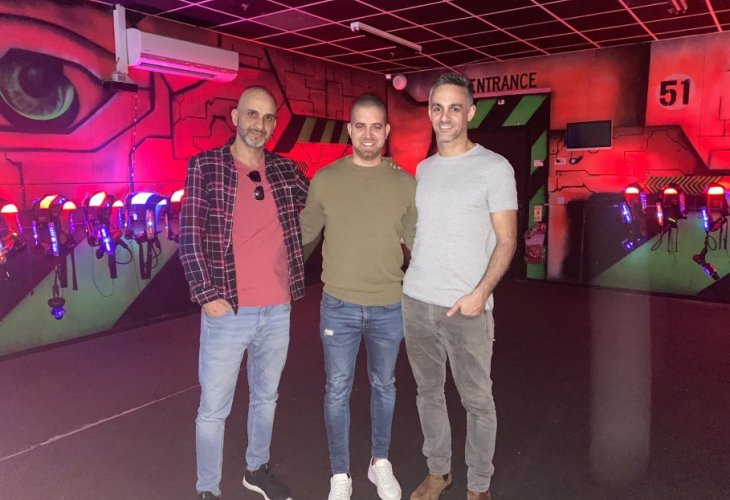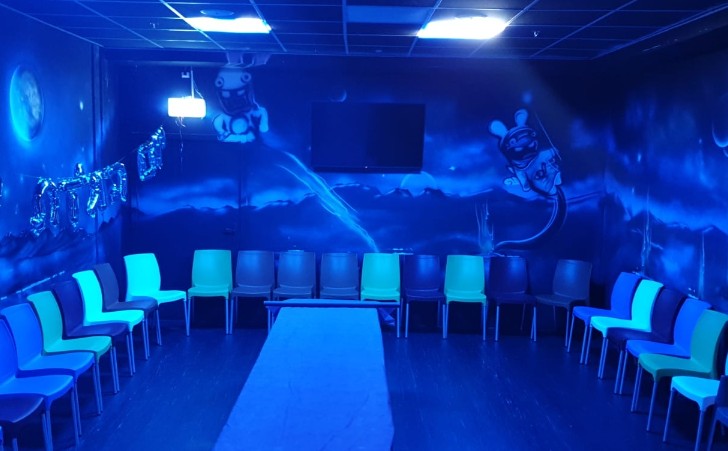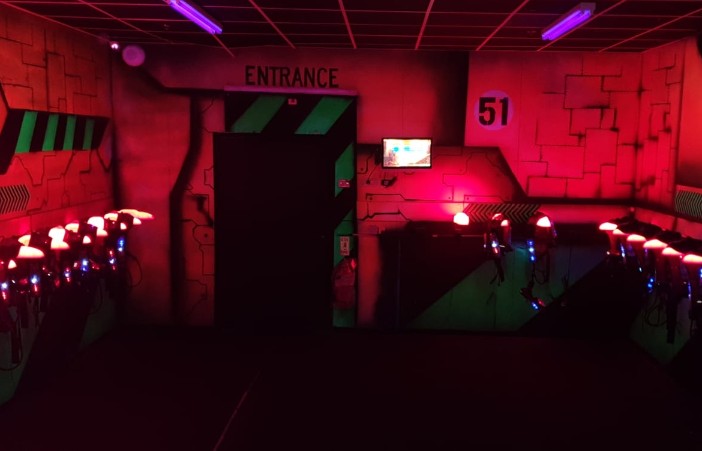The Partners Who Closed Their Businesses on Shabbat: 'We're Not Religious, But We Made This Decision Wholeheartedly'
Shimon Honors Shabbat: The unique story of Shimi Elimelech, an entrepreneur and businessman in the attractions field, who, together with his partners, decided to close their businesses on Shabbat. And this is just the beginning

For many years, but especially in recent generations, the halachic prohibition on working during Shabbat presents a significant challenge for many. It's fascinating and inspiring to learn about the story of Shimi Elimelech, 31, married and a father of two daughters, living in Nes Ziona. Along with his two partners, Kobi Mashania and Roni Amar, he owns several businesses in the attractions sector.
"I grew up in a traditional home," Elimelech recounts, "a house with Kiddush and holidays, but not much more than that. At some point, my father became fully observant, and after a while, he opened a kollel and began giving lessons. But my two brothers and I were already relatively mature, and it didn’t impact us much. Perhaps it affected us subconsciously because it’s amazing to see that both of my brothers also became religious after him.
"In fact, you could say that my brothers experienced a few years ago what I am going through now. My older brother worked for many years on Shabbat, and today he is religious. My other brother, who is younger than him but older than me, was always very interested in money and material things. He moved to the United States, and eight years ago when his child was born, he started becoming closer, and today he is truly religious. By the way, living abroad makes it even more difficult than in Israel. I hope, with Hashem's help, that I am also on the path to strengthening more and more."

Severe Impact on Family Matters
"It all started four years ago," says Elimelech, "when my friend and I decided to venture into the world of attractions. Both of us are entrepreneurs, we began in real estate and then searched for the next thing. One day, I told him: 'It’s a great idea to bring board or computer games to life. Take games that were successful virtually and transfer them to reality.' We looked into what was happening globally in this field and saw people doing similar things. Incidentally, one of these games later became the well-known escape room scene.
"This seemed like the right step, so we created a large facility in Rishon Letzion, which at the time was the largest in the country. The complex had three escape rooms and another area for virtual reality—technology where each participant receives special goggles and controllers. After wearing the goggles, they are essentially transported into a virtual world, losing grip on reality, choosing their game from a very wide range of options. It's a very strong and interesting experience."
What is your business mainly focused on now?
"Shortly after entering the attractions field, we discovered 'laser tag', which is actually our main area of activity now. We brought very innovative technology from the United States. We are the only ones using it domestically. Laser tag is essentially like paintball but doesn’t hurt, doesn’t make a mess, and takes place in an air-conditioned and covered space.
"For example, in our Petah Tikva branch, there are two battle arenas, each 500 meters in size, built on two levels. Up to 30 participants can play this game, and it can be held in various configurations and group compositions. The goal is to win, but unlike paintball, no one is eliminated midway. You don't suddenly run out of ammo; everyone plays until the end, and after the game ends, participants receive statistics showing who won, who was hit the most, and so on.
"The big change in the business happened five months ago," Elimelech openly shares, "when we decided that we wanted to start closing on Shabbat. None of us are religious, but my two partners and I are traditional, and it bothered us deeply working on Shabbat, making money on Shabbat; we felt very uncomfortable with it.
"It started from a personal standpoint—we were working on Shabbat, and it’s something we’ve never done before as it contradicts what we want and believe in. Furthermore, it also affects the family—it has quite difficult implications on family matters as well. Perhaps the most serious issue is that indirectly we caused others to violate Shabbat—people who wanted to enjoy what our venues offered. All these factors together made us feel very uncomfortable."

How did you actually go about doing it? Just get up and close?
"We have three 'Laser City' branches—Petah Tikva, Netanya, and Cinema City Glilot. In Netanya and Glilot, we are not allowed to close on Shabbat and holidays, so we have to close those branches completely. In Glilot, we are selling the branch, and in Netanya, we will take the equipment and open again in a location that allows not working on Shabbat. Regarding the Petah Tikva branch, where you can close on Shabbat, we decided to keep it and simply not work on Shabbat. It was a very tough business decision because the earnings on Shabbat and holidays constituted more than 65% of our business cycle, and we took a huge risk here.
"Regarding the implications of this, I can say openly that these are not simple steps. For the network as a whole and for the Petah Tikva branch in particular. We are concerned about the implications of this move, and people tell us that these concerns are the yetzer hara, and we should ignore them, but in the end, we have families to support and a lot of money is at stake here. We cannot afford to go bankrupt.
"We strive to strengthen our faith," adds Elimelech, "but it’s not always easy. Sometimes it’s strong, sometimes less so. Sometimes, doubts and difficulties also arise. In such moments, I try to influence my partners and strengthen them regarding Shabbat observance and faith in Hashem and His providence. We love Shabbat, and we try very hard for it."

'We Heard You Decided to Close on Shabbat, That’s Why We Came'
According to Elimelech, following the decision to close their businesses on Shabbat, they received various responses. "Religious people who come to us and hear that the venue is closed on Shabbat strengthen us a lot. There are even those who say: 'We heard you decided to close on Shabbat, and that's why we came.' On the other hand, thank God, I cannot say there are negative or accusatory responses, but certainly, there are people who tell us: 'If you open on Shabbat, you will be much better off. The place will succeed, it will be full, and you will earn a lot of money.'
"Nevertheless, our belief in divine providence is strong, and we try to believe that whoever sacrifices for Shabbat observance—Hashem will not disappoint him in the long run and won’t harm him. We always dreaded that the economic noose would tighten around our necks if we closed on Shabbat, and that it would lead us into very difficult places. Today, we truly see how challenging it is for us from a business standpoint without working on Shabbat, but we believe that with Hashem's help, everything will be fine, even excellent.
"Thus, by the way, as part of our efforts, we need the help of the religious community in this matter. It is important for us that religious people come to support us. We expect the arrival of the haredi and religious public. Hence, we are talking to anyone we can—rabbis, opinion leaders, event organizers, etc. Our branch in Petah Tikva is located at 30 Ben Zion Gliss Street, in 'B Center', and it's suitable for gender separation. Furthermore, we can host all types of groups, up to 150 people. In terms of pricing, we offer discounts for groups, and in the end, it’s a price that’s affordable for everyone.
"Additionally, for those wanting to mark a specific event – 'Laser City' is the perfect place for them. We have event rooms of different sizes, and we take care of decorations and refreshments, all at a very high level. One of the things that give us the most strength throughout the process we are going through is knowing we have an excellent product, and those who come to us are very satisfied. It really gives us the strength to continue, to strengthen in belief, to fulfill Hashem's will, and to sanctify His name publicly."

